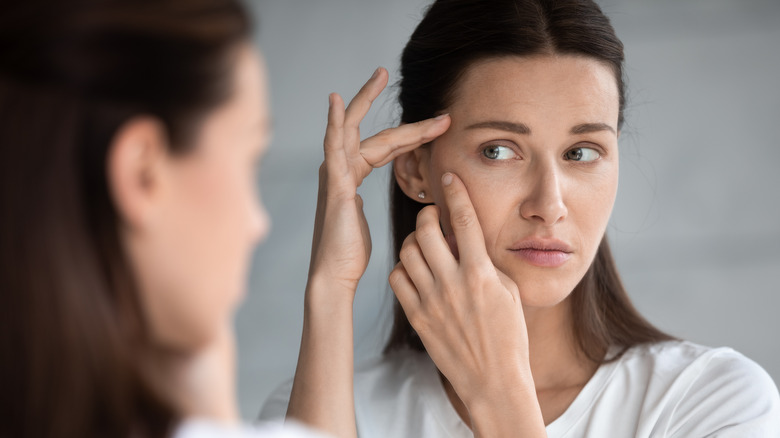The Real Reason Our Skin Wrinkles As We Age
Aging is, if we're lucky, a natural part of life. Our hair may gray and thin, our bodies change, and gravity gets to work on parts of ourselves we generally wish it wouldn't. Of those, the face is the most visible. Our ears droop, our noses change, and then there are the wrinkles.
For most people wrinkles are unavoidable. They're going to happen as we age and there really isn't much we can do about it, short of cosmetic surgery. We can use products and creams, but there are so many on the market and it's hard to tell which ones will actually work. To know that, we have to know why we wrinkle as we age.
There are, according to Scientific American, two main sources of aging factors. These sources are the external factors and the internal factors. External factors, as the name implies, are the things outside of our bodies. These can include stress level, pollution or sun exposure, and tobacco use. A few of these factors, like sun or tobacco exposure, are things we can control. But others, such as our stress or the pollution levels where we live, are often not entirely under our power.
Combination of factors
It can be hard to accept that some aging factors are outside our control. And that's what makes the other source of aging factors harder to deal with. These are the internal factors, the unstoppable changes our bodies go through as we age. One of these, as the Mayo Clinic explains, is the thinning and redistribution of fat in our faces. As the fat thins out and moves it leaves certain areas of skin looser than they were before, giving space for wrinkles to form. But loose skin isn't the only bodily change that leads to wrinkles.
Scientific American states that there are three compounds in our skin that give it a youthful appearance. One is glycosaminoglycans (also called GAGs) which keep skin hydrated. Elastin gives skin its elasticity and ability to rebound after being stretched. Finally there is collagen, which is the compound that keeps our skin firm. Up to the age of 20, humans produce the peak amount of collagen in their skin. After that age our production levels drop about 1% each year.
Wrinkles are the result of lower collagen levels combined with fat redistribution and the effects of gravity. They may be unavoidable but they can be minimized. Suzan Obagi, M.D., director of the Cosmetic Surgery and Skin Health Center at the University of Pittsburgh Medical Center, recommends both an SPF 35 sunscreen and, after the age of 25, a skincare routine that involves Retin-A.


